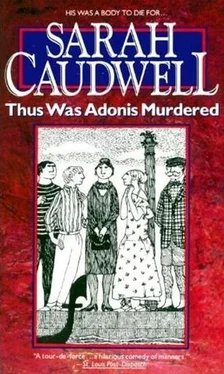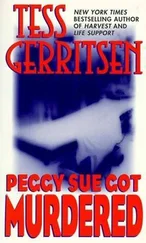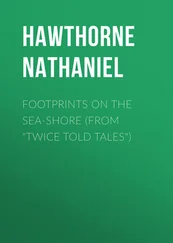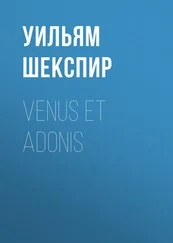The trouble is that in spite of my efforts I feel he may already have some suspicion of the nature of my interest in him. He will have become accustomed, in the course of his distasteful employment, to thinking the worst of everyone. It would, moreover, be typical of the practice of the Revenue to let me spend a great deal of time and effort admiring his soul and intellect without intending it to do me any ultimate good. If my fears on this point were to be well-founded, then, it seems to me, I might as well abandon subtlety altogether and adopt the more forthright and vigorous approach recommended by the dramatist Shakespeare. On the other hand, I would not wish to prejudice, by precipitate action, any good I may already have done myself by my restraint.
This morning I began to wonder if it might not be sensible, rather than spend a holiday altogether unenlivened by the pleasures of the flesh, to try my luck with the quite pretty waiter who brings my breakfast. There is something in his manner which suggests that his favours would be less hard to come by than those of the enchanting Ned: one would not, I think, have to talk much about his soul.
And yet afterwards, as we travelled peacefully along the Brenta towards Padua, with the wake of the boat tumbling the reeds at the waterside, I was so moved by the beauty of the surroundings and of Ned’s profile that I felt I would willingly devote the whole week, even if in vain, to undivided pursuit of him. Well, Selena, you will mock me again for being incurably sentimental.
The purpose of the excursion down the Brenta, from the point of view of the Art Lover, is to observe and appreciate the development of the Palladian villa. In the sixteenth century, it seems, all the Venetians decided to go and live in the country. This was due, I suppose, to the republication, as part of the Renaissance, of Horace’s Epistles, in which the poet speaks highly of the simple rustic life. Feeling that if they were going to live the simple life they ought to do the thing properly, the Venetians looked round for someone to build them villas as similar as possible to that occupied by Horace. Andrea Palladio, therefore, then a rising young architect, went out and bought a book by the Roman author Vitruvius, also republished as part of the Renaissance, and read the chapter on building villas. That, at least, is what he meant to read: as it happens, misled by the obscurity of the Latin, he actually read the chapter on building temples. This explains why the Veneto is full of villas looking more or less like the Parthenon, with the addition of the usual domestic offices.
From what one might call the social point of view, the day was not a success. Whenever I managed to draw Ned away from the main body of Art Lovers, with a view to admiring his soul and intellect, the Major would appear suddenly out of nowhere, crying “Jumping Jiminy, this place is quite something, isn’t it?” In the end I abandoned the unequal struggle.
Marylou’s husband still regards me with an unfriendly eye and seemed to be steering her away from me — I was hardly able to talk to her at all. I was obliged, on the other hand, to talk a great deal to Eleanor, who still has hopes of having a row with Graziella. She had two complaints about the excursion: first, that we had not visited enough villas; second, that we had arrived too late in Padua to appreciate the artistic glories of that city. I pointed out in vain that to remedy either of these shortcomings would of necessity aggravate the other. To distract her from any direct conflict with Graziella, I had to keep talking about the Trade Descriptions Act all the way back to Venice. This was rather wearing: it might have been less so if I actually knew anything about the Trade Descriptions Act.
The Major’s conversation at dinner followed, to begin with, its usual pattern, save that his anecdotes tend now to be couched in the form of useful advice, designed to assist me in various difficult situations: “The thing to do, if you’re stranded on shore after hours in Valletta—” “What you want to remember, if you’re running low on water in the Western Desert and Johnny Arab’s getting a bit edgy—” I attended as little as possible, and went back to worrying about Desdemona. In certain predicaments, I may well regret this.
Towards the end of the meal, however, he raised an entirely different subject. Leaning towards me and shielding his mouth, as one wishing to speak in confidence, he asked me if I remembered the French chappie Graziella had been talking about. He proved to be alluding to the late King Henri III of France, mentioned by Graziella as having visited the Villa Malcontenta on his return from Poland in 1583. She had further mentioned that his reign had been of short duration, attributing this to the aversion felt by his subjects to his effeminate habits.
“Don’t know if you followed,” said the Major, “what she said about his effeminate habits?”
“I gathered,” I said, “that the practices which attracted an unfavourable press consisted of something more than an excessive use of eau de Cologne on the handkerchief.”
“Well—” the Major appeared embarrassed. “Word to the wise and so forth. Nod’s as good as a wink. No names, no pack drill.”
“Yes?” I said, trying to be helpful.
“Saw quite a lot of that sort of thing in the Army, I’m afraid. Courts Martial and so forth. Got to know the signs. Well — just between you and me and the gatepost, m’dear, I wouldn’t be surprised if young Ned over there was a bit that way. No names, no pack drill — don’t want to say anything against the lad. Just — not the sort of chap I’d want to share a tent with. Hope you don’t mind my mentioning it, m’dear.”
I was not unduly surprised by this suggestion: it is almost invariably the first thing said about men with profiles by men without profiles. Indeed, it is a benevolent dispensation of Providence that those who express most dread of an unorthodox advance are usually those whom Nature has most effectively protected from any risk of one. Still, the remark placed me in a dilemma. Principle required me to say that it was, if true, no matter for criticism; expediency, on the other hand, urged me to impress on the Major my invincible prudishness. Seeking an answer which should reconcile the two:
“Unless you suppose me,” I said coldly, “to have designs of some sort on the young man, I cannot imagine why you should think the question of any interest to me. I would very much prefer not to discuss the matter.”
“Sorry, m’dear,” said the Major. “Just thought — well, thought you might be getting a bit smitten with him. Wouldn’t like to see you pick a wrong ’un.”
“My dear Bob,” I said, raising a Ragwort-like eyebrow, “I am most obliged to you for your concern. But I am not a swooning adolescent — I am a grown-up woman in practice at the English Bar.”
I was rather pleased with this, since there is, after all, a sense in which it is actually true. The Major was abject in his apologies. Allowing myself to be only somewhat mollified, I excused myself from coffee and came back to my room, to enjoy in privacy the pleasures of writing to you. The others having already withdrawn, the Major was left to entertain Eleanor Frostfield. You may think this a bit hard on Eleanor; but if she ever finds herself running low on water in the Western Desert, at least it won’t be my fault if she doesn’t know what to do about it.
I shall not post this tomorrow morning but shall wait to see if anything of interest occurs during the excursion to Verona. We had the choice between the full day excursion tomorrow, which includes Asolo and Vicenza, and the afternoon excursion on Friday. Hearing Ned sign on for the longer one, I naturally did likewise. Unfortunately, the Major has done the same. Still, perhaps the Major will miss the coach somewhere and be left stranded. Or perhaps Ned and I will both miss the coach somewhere and be left stranded together — that would be even better.
Читать дальше











